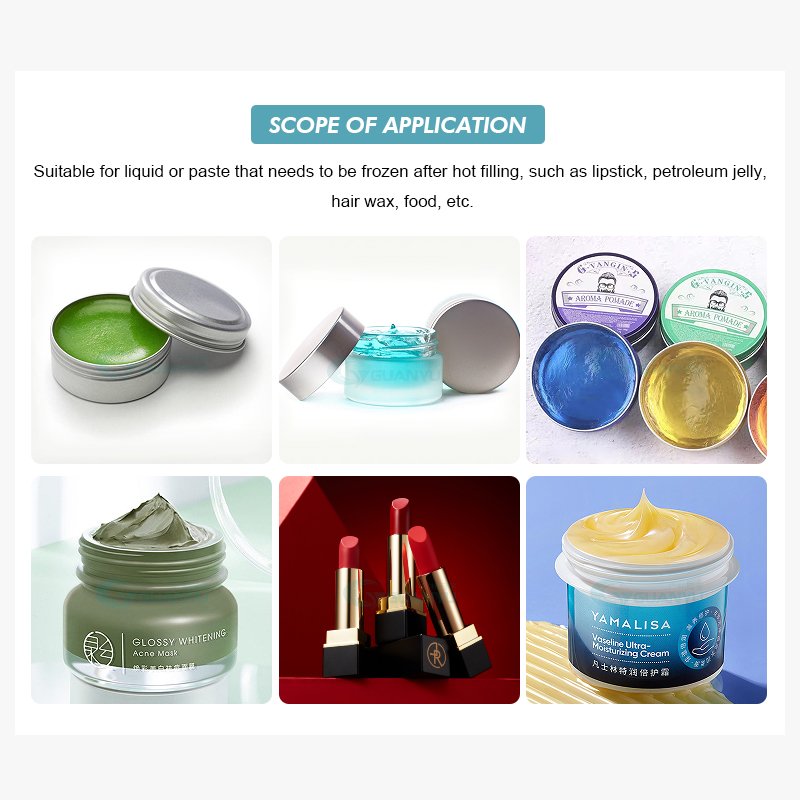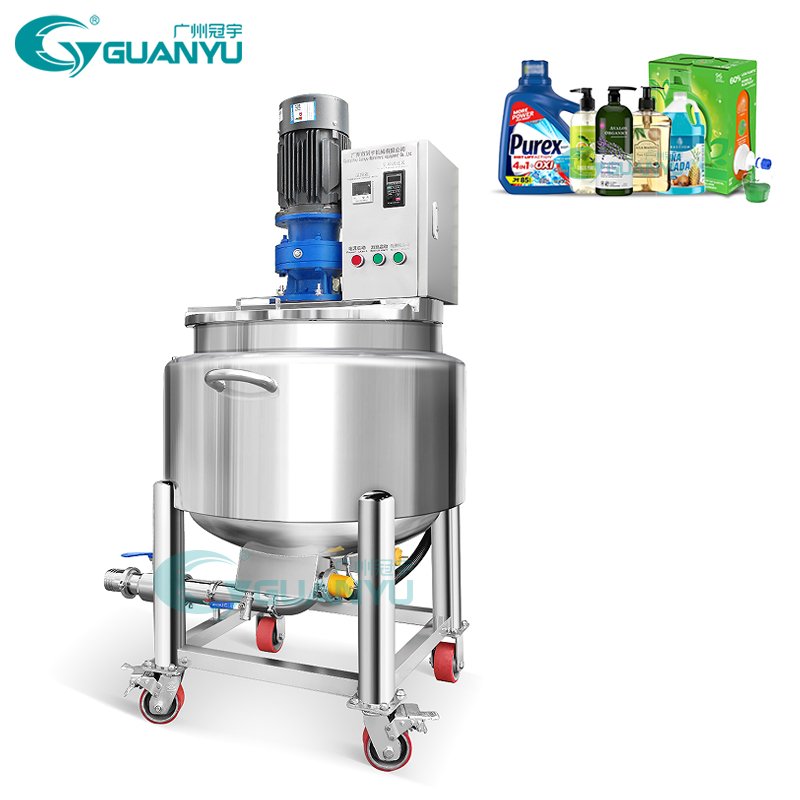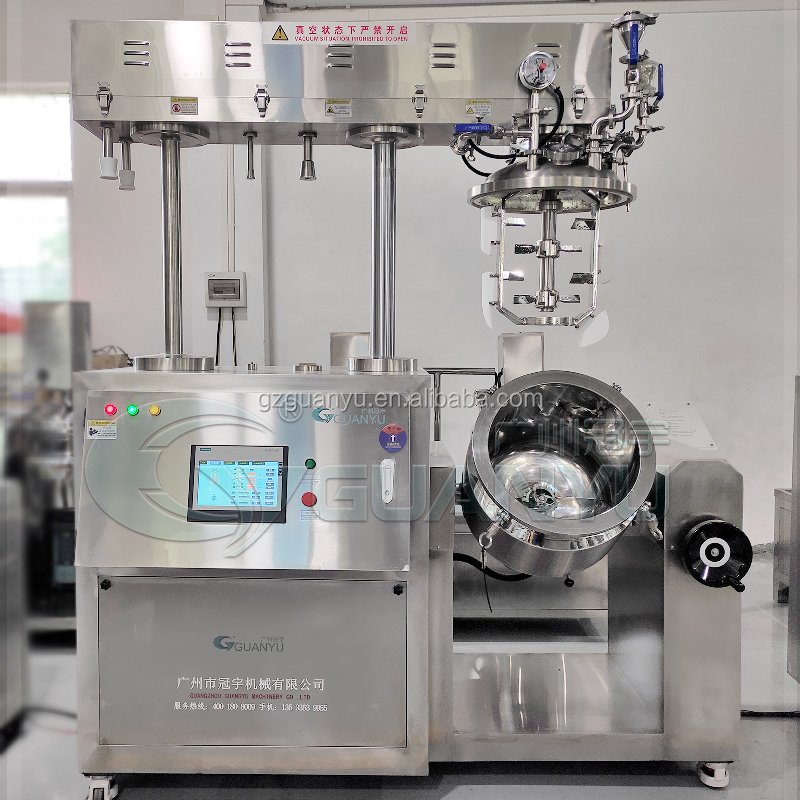Einführung in die Arten von Emulgatoren
Im Bereich der Herstellung von Gesichtscremes, Die Wahl der Emulgatoren spielt eine entscheidende Rolle für die Qualität, Stabilität, und Textur des Endprodukts. Emulgatoren sind wesentliche Hilfsmittel, die das Mischen nicht mischbarer Flüssigkeiten erleichtern, wie Öl und Wasser, um eine homogene und stabile Mischung zu schaffen. Dieser Abschnitt bietet einen Überblick über die wichtigsten Arten von Emulgatoren, die üblicherweise in der Kosmetikindustrie eingesetzt werden, Der Schwerpunkt liegt insbesondere auf Mischern/Homogenisatoren mit hoher Scherung, Emulgiermischer, und Vakuumemulgatoren. Durch das Verständnis der Arbeitsprinzipien, Vorteile, und Nachteile jeder Art, Leser können fundierte Entscheidungen treffen, die auf ihre spezifischen Produktionsanforderungen zugeschnitten sind.

Hochschermischer/Homogenisatoren
Hochschermischer/Homogenisatoren: Diese Emulgatoren wirken, indem sie eine starke mechanische Kraft anwenden, um die Öl- und Wassertröpfchen in kleinere Größen zu zerlegen, Dadurch entsteht eine feine und gleichmäßige Emulsion. Hochschermischer sind besonders effektiv bei der Herstellung stabiler Emulsionen mit glatter Textur und werden häufig für Produkte verwendet, die ein gleichmäßiges und luxuriöses Gefühl erfordern. Jedoch, Sie können während des Betriebs erhebliche Wärme erzeugen, die für hitzeempfindliche Zutaten möglicherweise nicht geeignet ist. Zusätzlich, Der hohe Energieverbrauch und die Wartungskosten sind Faktoren, die bei der Entscheidung für diesen Emulgatortyp berücksichtigt werden müssen.

Emulgiermischer
Emulgiermischer: Emulgiermischer nutzen eine Kombination aus mechanischem Rühren und chemischen Emulgatoren, um den Mischprozess zu erleichtern. Diese Mischer sind vielseitig einsetzbar und können ein breites Spektrum an Viskositäten verarbeiten, Dadurch eignen sie sich für verschiedene kosmetische Formulierungen. Der Hauptvorteil von Emulgiermischern ist ihre Fähigkeit, stabile Emulsionen mit minimalem Energieaufwand herzustellen. Jedoch, Die Effizienz dieser Mischer kann durch die Art und Konzentration der verwendeten chemischen Emulgatoren beeinflusst werden, und sie erreichen möglicherweise nicht den gleichen Feinheitsgrad wie Mischer mit hoher Scherung.

VakuumemulgatorS
Vakuumemulgatoren: Vakuumemulgatoren arbeiten unter reduzierten Druckbedingungen, Dies trägt dazu bei, den Lufteinschluss zu minimieren und die Stabilität der Emulsion zu erhöhen. Dieser Emulgatortyp eignet sich hervorragend zur Herstellung hochwertiger Gesichtscremes mit geschmeidiger und luftfreier Textur. Vakuumemulgatoren sind besonders vorteilhaft für Formulierungen, die flüchtige oder empfindliche Inhaltsstoffe enthalten, da die Niederdruckumgebung das Risiko von Oxidation und Zersetzung verringert. Trotzdem, Die Anfangsinvestition und die betriebliche Komplexität sind im Vergleich zu anderen Emulgatoren höher, wodurch sie besser für die Massenproduktion geeignet sind.

Für die Optimierung der Gesichtscremeproduktion ist es von entscheidender Bedeutung, die spezifischen Anwendungen und Einschränkungen jedes Emulgatortyps zu verstehen. Die Wahl des Emulgators sollte auf die gewünschten Produkteigenschaften abgestimmt sein, Produktionsmaßstab, und Kompatibilität der Inhaltsstoffe, um das bestmögliche Ergebnis zu gewährleisten.
Merkmale des Vakuumhomogenisierungsemulgators
Bei der Herstellung von Gesichtscremes, Die Auswahl der geeigneten Emulgierausrüstung ist entscheidend, um ein Produkt zu erhalten, das hohen Qualitätsstandards entspricht. Ein Vakuumhomogenisierungsemulgator zeichnet sich durch seine fortschrittlichen Eigenschaften und Vorteile aus, die den Emulgierungsprozess deutlich verbessern.
Einer der Hauptvorteile eines Vakuumhomogenisierungsemulgators ist seine Fähigkeit, einen hocheffizienten Emulgierungseffekt zu erzeugen. Betrieb in einer Vakuumumgebung, Diese Ausrüstung minimiert den Lufteinschluss, Dies ist entscheidend für die Herstellung einer glatten und gleichmäßigen Textur in Gesichtscremes. Das Fehlen von Luftblasen während des Emulgierungsprozesses verbessert nicht nur die Ästhetik des Produkts, sondern erhöht auch seine Stabilität und Haltbarkeit. Folglich, Das Endprodukt zeichnet sich durch eine hervorragende Textur und Konsistenz aus, wesentliche Eigenschaften für hochwertige Kosmetikprodukte.
Ein weiteres wichtiges Merkmal vakuumhomogenisierender Emulgatoren ist ihre Fähigkeit, über große Chargen hinweg eine gleichbleibende Produktqualität aufrechtzuerhalten. Diese Konsistenz wird durch die präzise Kontrolle verschiedener Parameter wie der Temperatur erreicht, Druck, und Mischgeschwindigkeit, Dabei wird sichergestellt, dass jede Charge die gleichen strengen Qualitätsstandards erfüllt. Diese Möglichkeit ist besonders für Hersteller von Vorteil, die ihre Produktion steigern möchten, ohne Kompromisse bei der Qualität ihrer Gesichtscremes einzugehen.
Darüber hinaus, Vakuumhomogenisierende Emulgatoren bieten Flexibilität für unterschiedliche Produktionsmaßstäbe. Ganz gleich, ob Sie kleine Chargen für Nischenmärkte oder Großserien für den Mainstream-Vertrieb herstellen, Diese Ausrüstung kann an unterschiedliche Produktionsanforderungen angepasst werden. Die Vielseitigkeit vakuumhomogenisierender Emulgatoren macht sie zu einem unschätzbaren Vorteil für kleine und große Kosmetikhersteller.

Beispiele aus der Praxis unterstreichen die Wirksamkeit vakuumhomogenisierender Emulgatoren. Zum Beispiel, Eine renommierte Hautpflegemarke berichtete a 30% Reduzierung der Produktionszeit und a 20% Verbesserung der Produktstabilität nach Umstellung auf einen Vakuumhomogenisierungsemulgator. Ähnlich, Eine Fallstudie, an der ein mittelständisches Kosmetikunternehmen beteiligt war, verdeutlichte die Fähigkeit der Anlage, konsistent einheitliche Chargen zu produzieren, Dadurch wird die allgemeine Kundenzufriedenheit gesteigert.
Zusammenfassung
Der Vakuumhomogenisierungsemulgator ist ein vielseitiges und effizientes Werkzeug, das die Herstellung hochwertiger Gesichtscremes deutlich verbessert. Seine Fähigkeit, eine hervorragende Textur zu erzeugen, Aufrechterhaltung einer gleichbleibenden Qualität über große Chargen hinweg, und die Anpassung an verschiedene Produktionsmaßstäbe machen es zu einem unverzichtbaren Ausrüstungsgegenstand in der Kosmetikindustrie.

Danke fürs Teilen. Ich habe viele Ihrer Blogbeiträge gelesen, Cool, Dein Blog ist sehr gut.